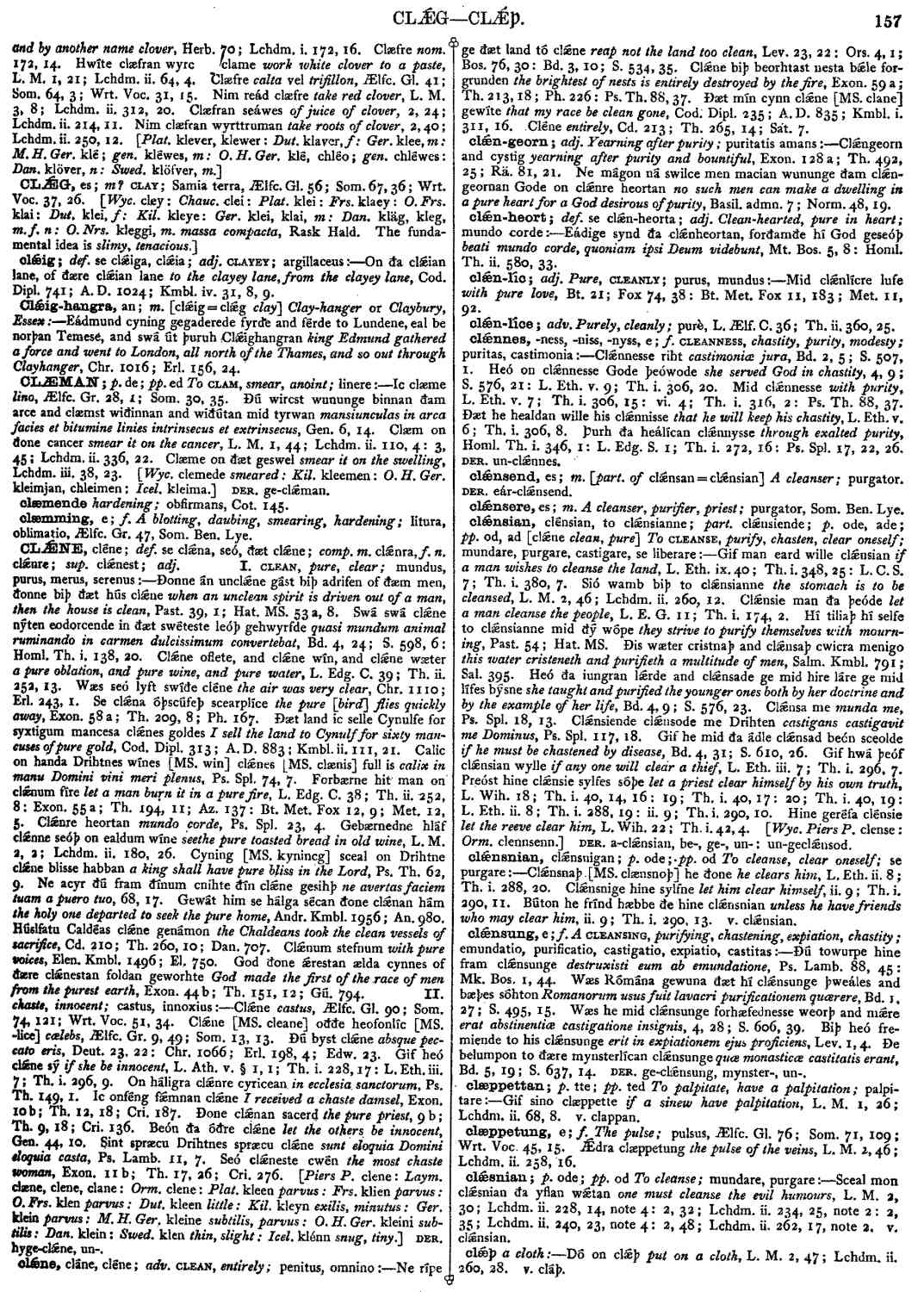CLǼNE
- adjective
-
Ðonne án unclǽne gást biþ adrifen of ðæm men, ðonne biþ ðæt hús clǽne
when an unclean spirit is driven out of a man, then the house is clean,
- Past. 39, 1 ;
- Hat. MS. 53a, 8 .
-
Swá swá clǽne nýten eodorcende in ðæt swéteste leóþ gehwyrfde
quasi mundum animal ruminando in carmen dulcissimum convertebat,
- Bd. 4, 24 ;
- S. 598, 6: Homl. Th. i. 138, 20 .
-
Clǽne oflete, and clǽne wín, and clǽne wæter
a pure oblation, and pure wine, and pure water,
- L. Edg. C. 39 ;
- Th. ii. 252, 13 .
-
Wæs seó lyft swíðe cléne
the air was very clear,
- Chr. 1110 ;
- Erl. 243, 1 .
-
Se clǽna óþscúfeþ scearplíce
the pure [bird] files quickly away,
- Exon. 58a: Th. 209, 8 ;
- Ph. 167 .
-
Ðæt land ic selle Cynulfe for syxtigum mancesa clǽnes goldes
I sell the land to Cynulf for sixty mancuses of pure gold,
- Cod. Dipl. 313 ;
- A. D. 883 ;
- Kmbl. ii. 111, 21 .
-
Calic on handa Drihtnes wínes [MS. win] clǽnes [MS. clænis] full is
calix in manu Domini vini meri plenus,
- Ps. Spl. 74, 7 .
-
Forbærne hit man on clǽnum fíre
let a man burn it in a pure fire,
- L. Edg. C. 38 ;
- Th. ii. 252, 8: Exon. 55a ;
- Th. 194, 11 ;
- Az. 137: Bt. Met. Fox 12, 9 ;
- Met. 12, 5 .
-
Clǽnre heortan
mundo corde,
- Ps. Spl. 23, 4 .
-
Gebærnedne hláf clǽnne seóþ on ealdum wíne
seethe pure toasted bread in old wine,
- L. M. 2, 2 ;
- Lchdm. ii. 180, 26 .
-
Cyning [MS. kynincg] sceal on Drihtne clǽne blisse habban
a king shall have pure bliss in the Lord,
- Ps. Th. 62, 9 .
-
Ne acyr ðú fram ðínum cnihte ðín clǽne gesihþ
ne avertas faciem tuam a puero tuo,
- 68, 17 .
-
Gewát him se hálga sécan ðone clǽnan hám
the holy one departed to seek the pure home,
- Andr. Kmbl. 1956 ;
- An. 980 .
-
Húslfatu Caldéas clǽne genámon
the Chaldeans took the clean vessels of sacrifice,
- Cd. 210 ;
- Th. 260, 10 ;
- Dan. 707 .
-
Clǽnumstefnum
with pure voices,
- Elen. Kmbl. 1496 ;
- El. 750 .
-
God ðone ǽrestan ælda cynnes of ðære clǽnestan foldan geworhte
God made the first of the race of men from the purest earth,
- Exon. 44b ;
- Th. 151, 12 ;
- Gú. 794 .
-
Clǽne
castus,
- Ælfc. Gl. 90 ;
- Som. 74, 121 ;
- Wrt. Voc. 51, 34 .
-
Clǽne [MS. cleane] oððe heofonlíc [MS. -lice] Cælebs,
- Ælfc. Gr. 9, 49 ;
- Som. 13, 13 .
-
Ðú byst clǽne
absjue peccato eris,
- Deut. 23, 22: Chr. 1066 ;
- Erl. 198, 4 ;
- Edw. 23 .
-
Gif heó clǽne sý
if she be innocent,
- L. Ath. V. § 1, 1 ;
- Th. i. 228, 17: L. Eth. iii. 7 ;
- Th. i. 296, 9 .
-
On háligra clǽnre cyricean
in ecclesia sanctorum,
- Ps. Th. 149, 1 .
-
Ic onféng fǽmnan clǽne
I received a chaste damsel,
- Exon. 10b ;
- Th. 12, 18 ;
- Cri. 187 .
-
Ðone clǽnansacerd
the pure priest,
- 9b ;
- Th. 9, 18 ;
- Cri. 136 .
-
Beón ða óðre ciǽne
let the others be innocent,
- Gen. 44, 10 .
-
Sint spræcu Drihtnes spræcu clǽne
sunt eloquia Domini eloquia casta,
- Ps. Lamb. 11, 7 .
-
Seó clǽneste cwén
the most chaste woman,
- Exon. 11b ;
- Th. 17, 26 ;
- Cri. 276 .
Bosworth, Joseph. “CLǼNE.” In An Anglo-Saxon Dictionary Online, edited by Thomas Northcote Toller, Christ Sean, and Ondřej Tichy. Prague: Faculty of Arts, Charles University, 2014. https://bosworthtoller.com/6269.
Checked: 1